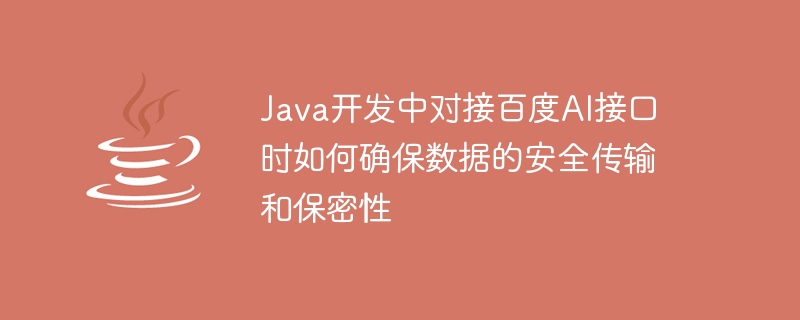
Java开发中对接百度AI接口时如何确保数据的安全传输和保密性
随着人工智能技术的快速发展,百度AI接口成为了很多Java开发者在项目中使用的必备工具。然而,对于使用百度AI接口的开发者来说,数据的安全传输和保密性是一个关键的问题。本文将介绍如何在Java开发中对接百度AI接口时确保数据的安全传输和保密性。
在对接百度AI接口时,首先要确保使用的是HTTPS协议进行数据传输。HTTPS协议通过在传输层添加SSL/TLS来对HTTP进行加密,保证了数据在传输过程中的安全性。在Java开发中,可以通过使用HttpsURLConnection类来发送HTTPS请求,示例如下:
import java.io.BufferedReader;
import java.io.InputStreamReader;
import java.net.URL;
import javax.net.ssl.HttpsURLConnection;
public class HttpsRequest {
public static void main(String[] args) throws Exception {
String url = "https://aip.baidubce.com/api/xxx";
URL obj = new URL(url);
HttpsURLConnection con = (HttpsURLConnection) obj.openConnection();
// 设置请求方法为POST
con.setRequestMethod("POST");
// 添加请求头部信息,如API Key等
con.setRequestProperty("Content-Type", "application/json");
con.setRequestProperty("API-Key", "your-api-key");
// 发送POST请求
con.setDoOutput(true);
// 接收和处理返回结果
BufferedReader in = new BufferedReader(new InputStreamReader(con.getInputStream()));
String inputLine;
StringBuilder response = new StringBuilder();
while ((inputLine = in.readLine()) != null) {
response.append(inputLine);
}
in.close();
// 输出返回结果
System.out.println(response.toString());
}
}为了确保只有合法的请求才能访问百度AI接口,开发者必须在请求中提供正确的API Key和Secret Key。API Key用于标识应用程序的身份,而Secret Key则用于对请求进行数字签名。在Java开发中,可以使用Apache HttpClient库来进行HTTP请求,并使用API Key和Secret Key进行身份验证,示例代码如下:
import java.nio.charset.StandardCharsets;
import java.security.GeneralSecurityException;
import java.security.KeyFactory;
import java.security.PrivateKey;
import java.security.spec.PKCS8EncodedKeySpec;
import java.util.Base64;
import javax.crypto.Cipher;
import org.apache.http.HttpEntity;
import org.apache.http.HttpHeaders;
import org.apache.http.HttpResponse;
import org.apache.http.client.HttpClient;
import org.apache.http.client.methods.HttpPost;
import org.apache.http.entity.StringEntity;
import org.apache.http.impl.client.HttpClients;
import org.apache.http.util.EntityUtils;
import org.json.JSONObject;
public class AiApiRequest {
public static void main(String[] args) throws Exception {
String url = "https://aip.baidubce.com/api/xxx";
String apiKey = "your-api-key";
String secretKey = "your-secret-key";
// 构造请求参数
JSONObject params = new JSONObject();
params.put("key1", "value1");
params.put("key2", "value2");
String requestBody = params.toString();
// 加密请求参数
String encryptRequestBody = encrypt(requestBody, secretKey);
// 构建HTTP请求
HttpClient httpClient = HttpClients.createDefault();
HttpPost httpPost = new HttpPost(url);
// 设置请求头部信息
httpPost.setHeader(HttpHeaders.CONTENT_TYPE, "application/json");
httpPost.setHeader(HttpHeaders.AUTHORIZATION, "Bearer " + apiKey);
// 设置请求体内容
StringEntity entity = new StringEntity(encryptRequestBody);
httpPost.setEntity(entity);
// 发送HTTP请求
HttpResponse response = httpClient.execute(httpPost);
// 处理返回结果
HttpEntity responseEntity = response.getEntity();
String responseBody = EntityUtils.toString(responseEntity, StandardCharsets.UTF_8);
// 输出返回结果
System.out.println(responseBody);
}
private static String encrypt(String requestBody, String secretKey) throws Exception {
byte[] keyBytes = Base64.getDecoder().decode(secretKey);
PKCS8EncodedKeySpec keySpec = new PKCS8EncodedKeySpec(keyBytes);
KeyFactory keyFactory = KeyFactory.getInstance("RSA");
PrivateKey privateKey = keyFactory.generatePrivate(keySpec);
Cipher cipher = Cipher.getInstance("RSA/ECB/PKCS1Padding");
cipher.init(Cipher.ENCRYPT_MODE, privateKey);
byte[] encryptedBytes = cipher.doFinal(requestBody.getBytes(StandardCharsets.UTF_8));
return Base64.getEncoder().encodeToString(encryptedBytes);
}
}为了确保数据的安全性和保密性,建议开发者定期更新API Key和Secret Key。并且在更新后,要确保及时替换旧的API Key和Secret Key,并重新部署应用程序。
综上所述,对于Java开发中对接百度AI接口时确保数据的安全传输和保密性,我们可以采取使用HTTPS协议进行数据传输、使用API Key和Secret Key进行身份验证、定期更新API Key和Secret Key等措施。通过这些措施,可以有效地保护应用程序和用户数据的安全。
以上是Java开发中对接百度AI接口时如何确保数据的安全传输和保密性的详细内容。更多信息请关注PHP中文网其他相关文章!




